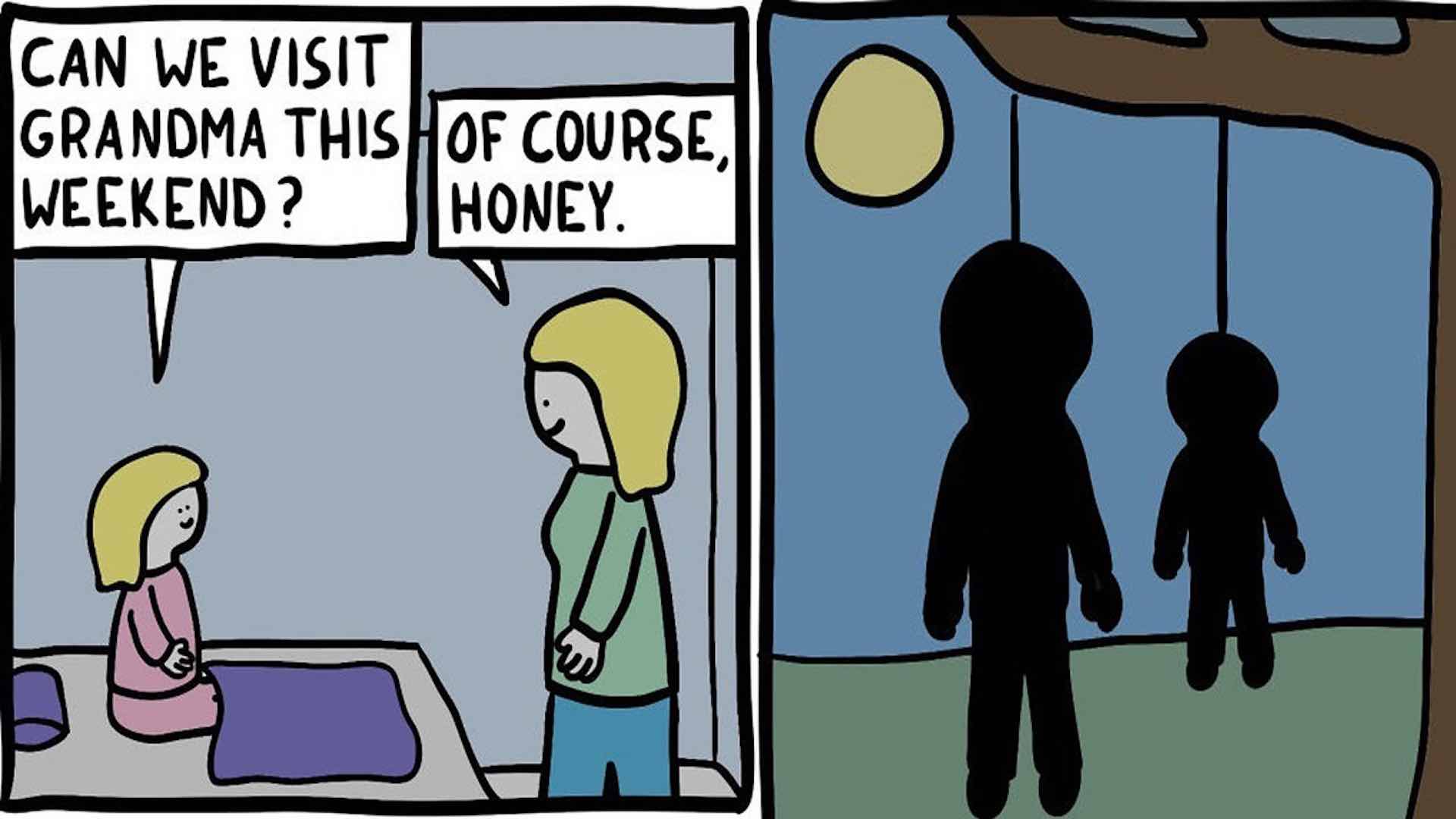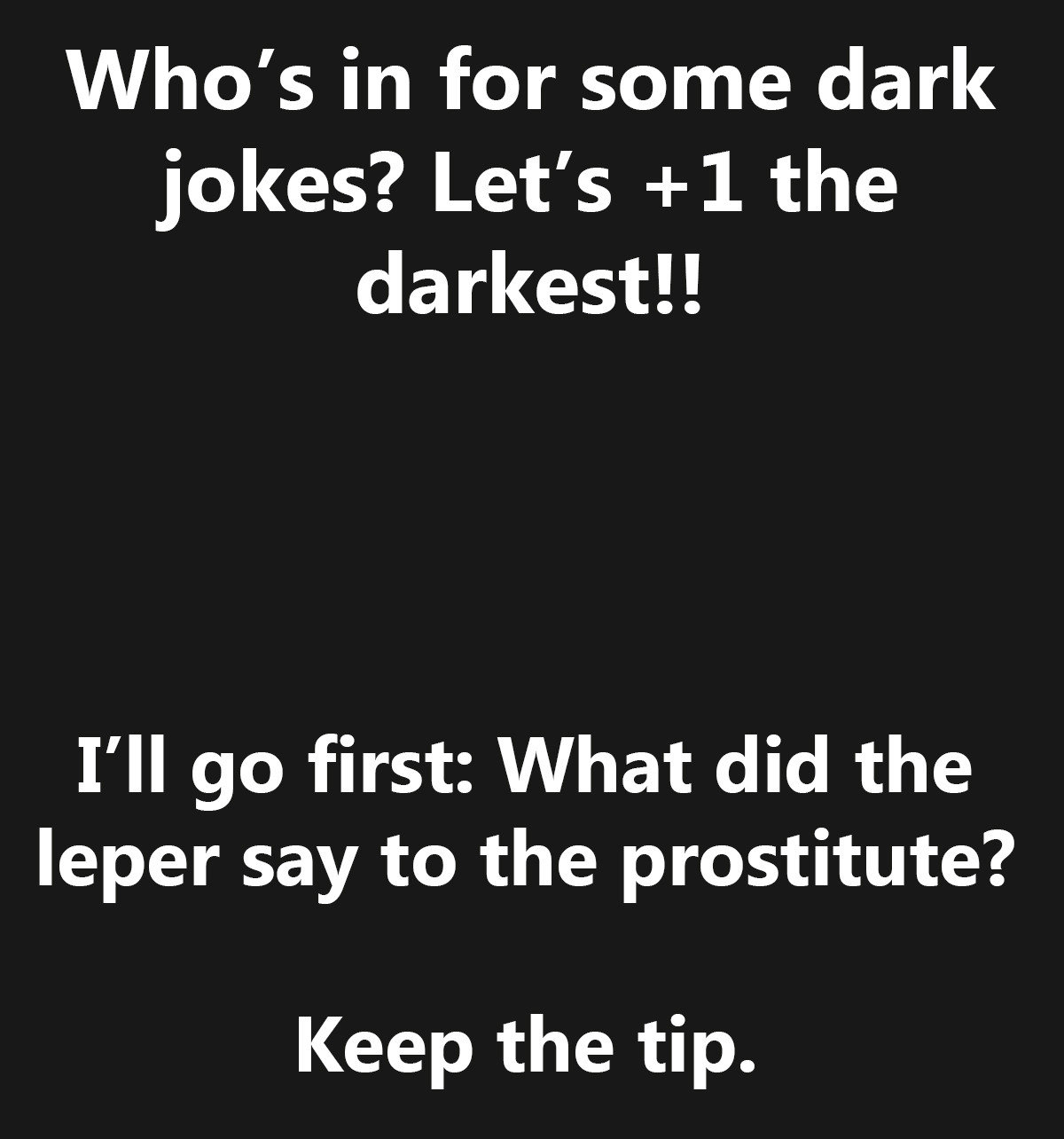Exploring The Depths Of Humor: The Darkest Jokes
In the realm of comedy, there exists a genre that often toes the line between acceptable and taboo: darkest jokes. These jokes, while they may elicit laughter from some, can leave others feeling uneasy or even offended. The humor in these jokes often arises from their ability to confront uncomfortable truths and societal norms, allowing audiences to explore the darker aspects of life through a comedic lens. Yet, what makes these jokes so appealing to some, and why do they evoke such strong reactions?
At their core, darkest jokes serve as a coping mechanism for many. They provide a way to discuss serious topics—such as death, illness, and tragedy—in a manner that is more palatable. By wrapping painful subjects in humor, comedians and audiences alike can navigate the complexities of human existence. However, the line between funny and offensive is incredibly thin, leaving many to wonder: when does humor go too far?
As we delve deeper into the world of darkest jokes, it's essential to consider the various perspectives surrounding this controversial form of comedy. Some find solace in the ability to laugh at life's misfortunes, while others argue that such humor can perpetuate harmful stereotypes and desensitize audiences to real-world issues. In this article, we will explore the intricacies of darkest jokes, their cultural implications, and the psychological factors that underlie their appeal.
What Are Darkest Jokes?
Darkest jokes, often referred to as dark humor, are characterized by their provocative nature. They tackle subjects that are typically considered taboo or sensitive, such as death, addiction, and mental illness. The humor arises from the juxtaposition of these serious topics with lighthearted punchlines or absurd scenarios. While some may find these jokes to be a refreshing take on life's grim realities, others may view them as distasteful or offensive.
Why Do People Enjoy Dark Humor?
There are several reasons why individuals are drawn to darkest jokes:
- Coping Mechanism: Humor can be a way to deal with difficult emotions and experiences.
- Social Commentary: Dark jokes often provide insightful commentary on societal issues.
- Shock Value: The element of surprise can elicit laughter, making the joke memorable.
- Bonding Experience: Sharing dark humor can create a sense of camaraderie among those who appreciate it.
Are There Boundaries to Dark Humor?
While dark humor can be an effective tool for coping, there are still boundaries that comedians and audiences must consider. What one person finds funny, another may find deeply offensive. The key is understanding the context in which the joke is told and who the audience is. Contextual awareness can make a significant difference in how a joke is received.
Who Are Some Famous Comedians Known for Their Darkest Jokes?
Several comedians have made a name for themselves by embracing the art of dark humor. Some notable figures include:
- Anthony Jeselnik: Known for his sharp wit and unapologetic approach to taboo subjects.
- Bill Burr: Often blends dark humor with social commentary in his stand-up routines.
- Dave Chappelle: Tackles complex issues with a mix of humor and thought-provoking insights.
- Sarah Silverman: Uses her platform to challenge societal norms through dark comedy.
What Makes Anthony Jeselnik Stand Out in Dark Comedy?
Anthony Jeselnik is often regarded as a master of dark humor. His unique style is characterized by meticulously crafted one-liners and a fearless approach to sensitive topics. Jeselnik has built a reputation for pushing the envelope and challenging audiences to confront uncomfortable truths. His ability to blend shock value with cleverness has garnered both praise and criticism from fans and detractors alike.
What Should We Know About Anthony Jeselnik's Background?
| Detail | Information |
|---|---|
| Name | Anthony Jeselnik |
| Date of Birth | December 22, 1978 |
| Birthplace | Pittsburgh, Pennsylvania, USA |
| Education | University of Pittsburgh |
| Notable Works | Comedy Central Presents, The Jeselnik Offensive, Fire in the Maternity Ward |
Are Dark Jokes a Reflection of Society’s Taboo Topics?
Dark jokes often serve as a reflection of societal taboos, allowing comedians to challenge the status quo and prompt discussions about difficult subjects. By addressing topics that are typically shunned in polite conversation, comedians can shed light on issues that need to be examined. This form of humor can bring awareness to social injustices, mental health issues, and other critical matters that often go unnoticed.
What Are Some Examples of Darkest Jokes?
While the nature of darkest jokes can be sensitive, here are a few examples that highlight the genre's essence:
- "I told my wife she was drawing her eyebrows too high. She looked surprised." – A play on words that highlights a common beauty faux pas.
- "My therapist told me time heals all wounds. So, I stabbed her. Now we wait." – A dark twist on the idea of patience and healing.
- "I have a joke about trickle-down economics, but 99% of you will never get it." – A social commentary on economic disparities.
How Can We Navigate Dark Humor Responsibly?
Navigating the world of darkest jokes requires mindfulness and sensitivity. Here are some tips to approach dark humor responsibly:
- Know Your Audience: Consider who you are sharing the joke with and their potential reactions.
- Understand Context: The timing and setting of the joke can greatly influence its reception.
- Be Open to Feedback: If someone finds a joke offensive, be willing to listen and adjust your approach.
- Use Humor to Spark Conversations: Instead of simply making a joke, use it as a springboard for deeper discussions about the topic.
Conclusion: The Fine Line of Darkest Jokes
Darkest jokes are a complex and often controversial aspect of comedy. They can provide a unique lens through which to view societal issues and personal struggles, but they also carry the risk of offending or alienating audiences. As we continue to explore the depths of humor, it's essential to approach dark jokes with an open mind and a willingness to engage in meaningful conversations about the topics they address. Ultimately, the power of darkest jokes lies in their ability to challenge our perceptions, provoke thought, and remind us of the complexities of the human experience.



ncG1vNJzZmivp6x7s7HBnqOrmZ6YtbjFzmeaqKVfnru0tcahq6xpX5mus7fErKtmop%2BgsrR6x62kpQ%3D%3D